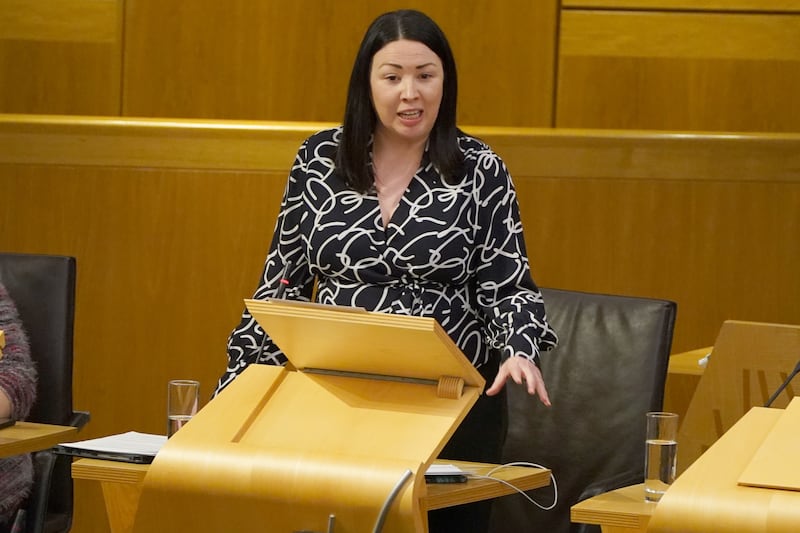Scotland’s First Minister is being urged to intervene in the controversial construction of a new dam in Indonesia – a project which conservationists fear could impact on the world’s rarest ape.
Campaigners at the Mighty Earth group say the Scottish Government is “well placed to do its bit” as the company building the structure also owns and operates wind farms in Scotland.
The Chinese State Development and Investment Corporation (SDIC) is currently building the Batang Toru dam in northern Sumatra, with the project said to be sited in the heart of the rare Tapanuli orangutan’s natural habitat.
With no more than 800 of the creatures left in existence, the Tapanuli orangutan has been described by the World Wildlife Fund as the most endangered of all great apes.
As Beijing-based SDIC Power has a subsidiary firm, Red Rock Power, which has its headquarters in Edinburgh, Scottish Government ministers are now being pressed to intervene.
A letter has been sent to Humza Yousaf, as well as biodiversity minister Lorna Slater, from a number of Scottish, Indonesian and international campaign groups, together with concerned scientists.
The groups, including Mighty Earth, Friends of the Earth Scotland, the Primate Society of Great Britain and Orangutan Outreach, told Mr Yousaf that having a “trail of profits from Scottish renewable wealth to a project mired in controversy” would undermine Scotland’s position as a “global leader on the protection of biodiversity”.
Mr Yousaf and Ms Slater are now being asked to “formally raise this issue with SDIC and Red Rock Power, and call for a meeting between the dam developers and independent scientists”.
Amanda Horowitz, senior director at Mighty Earth, said “the Tapanuli orangutan’s home in the forests of Batang Toru in Sumatra is being destroyed by the construction of a wholly unnecessary and toxic dam project”.
She added: “Calls for action are coming from across the globe and, unlikely as it may seem, the Scottish Government is well placed to do its bit and convene a meeting as soon as possible between the developers and international conservation scientists.
“The threat is urgent and there is no time to lose if we’re to save a species, some of our closest relatives, from being wiped off the face of the Earth.”
Andi Muttaqien, of the Indonesian group Satya Bumi, said: “Who benefits from the Batang Toru dam? Clearly not the Tapanuli orangutan, whose habitat is under threat…
“The dam’s electricity might have been needed in 2015, but now, eight years into construction, there is oversupply in the region, with the electricity slated to be sold at an overinflated price.”
Serge Wich, professor of primate biology at Liverpool John Moores University, said: “The Tapanuli orangutan was only identified in 2017, but it has been estimated that the population has already halved since the 1980s. Now, there are fewer than 800 left and that is an estimate from more than 10 years ago so numbers are likely lower now due to the development of the hydro power dam and other activities in the area.
“If the adult population decreases by more than 1% per year – that’s fewer than eight individuals – the genetic diversity could decline to the point of no return. So we really need to halt any development in the area to avoid further losses.”

Labour MSP Monica Lennon, who has also taken an interest in the issue, said: “Scotland is a key player in international development and this is a test case for our role on the global stage.
“Does this country champion biodiversity, environmental rights and workers’ safety, as we would like to think?
“Scottish ministers may not be able to stop this project outright, but the fact that the dam’s developers operate in Scotland gives us a rare opportunity to use a little ‘soft power’ in defence of workers’ rights, stopping ecocide and the survival of the world’s most endangered great ape.”
A Scottish Government spokesperson said: “The Scottish Government has not provided any funding support to Red Rock Power in relation to its offshore wind activities in Scotland.
“Officials last met with Red Rock Power in November 2022 to discuss progress on their development of the Inch Cape Offshore Wind farm off the coast of Angus.
“Scottish ministers are committed to protecting the natural environment and those who call it their home, endangered species especially need our help to survive, and where possible thrive.
“There is an urgent need for action at all levels to tackle the twin crises of biodiversity loss and climate change to ensure a nature-positive world and Scotland stands ready to play its part.”
Red Rock Power was contacted for comment.








